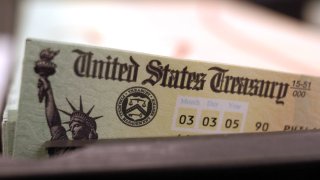
The White House is warning state and local governments about severe cuts to disaster relief, Medicaid, infrastructure grants, school money and other programs if Congress fails to raise the U.S. debt limit.
A fact sheet for state and local officials that was obtained by The Associated Press is an attempt to ratchet up the public pressure on Senate Republican leader Mitch McConnell. President Joe Biden has insisted so far on bipartisan backing to increase the cap on debt that was almost entirely accrued before he took office, but McConnell, R-Ky., has been unmoved and has repeatedly said that Democrats must act on their own.
The Treasury Department has engaged in extraordinary measures to keep the government running after the suspended debt limit was reinstated in August at a level of $22 trillion, about $6 trillion less than current total debt load. Treasury's extraordinary measures will be exhausted by October, creating the potential for default.
The debt limit is the amount of money Congress allows the Treasury to borrow to keep the government running.
It was suspended three times during the Trump administration and has been lifted dozens of times since 1960. Created at the start of World War I so Congress would no longer need to approve each bond issuance, the debt limit has evolved into a political weapon as borrowing has sharply escalated over the past two decades.
With the total debt standing at $28.4 trillion, the government would be forced to cut deeply into programs unless the restrictions on borrowing are lifted or suspended. The risk of a recession and turmoil in the financial market would make it harder for states and cities to borrow, while also playing havoc with public pension investments.
The Biden administration's fact sheet makes the case that the pain would be spread among the states because many programs rely on federal dollars. The government's ability to respond to natural disasters such as hurricanes, earthquakes or wildfires would be curtailed.
Politics
Political news from the U.S. Capitol, White House and around Washington, D.C., Maryland and Virginia
States would face severe Medicaid shortfalls because the federal government covers two-thirds of the costs. About 20% of Americans get their health insurance through Medicaid and the Children's Health Insurance Program.
Roughly $100 billion in infrastructure grants for highways, airports and public transit would be jeopardized. The more than $50 billion for special education, school districts serving poorer students and other programs would also be threatened, as would $30 billion in food assistance and $10 billion for public health.



